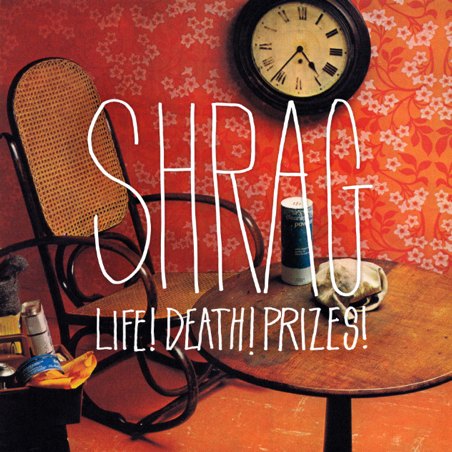Where does post-punk end and indie begin? Historically, I guess, somewhere around 1983-84. But as far as describing current bands go, it seems to me that post-punk infers what indie used to mean: primarily guitar-based music that is nevertheless innovative and experimental, and independent from the mainstream. Using the phrase "post-punk" is just another way of saying "indie" without having the person you’re talking to walk swiftly away with their hands clamped over their ears. Because indie, actually, has become devalued; a weak thing, a generic term for boring guitar bands on major labels, or their crapper counterparts who just wish they were on a major label, selling their songs for adverts and ringtones, and filling arenas with club-footed, boozy bombast and whiny, insincere love songs. Or middle-class mummy’s boys, making middle-of-the-road mumblings with mandolins and maudlin beards, for Jools Holland and Jeremy Vine to patronise and just as soon forget.
It wasn’t always like this. And Shrag- an acronym for Sussex Heights Roving Artists Group, dontcha know, referring to the crappy Brighton block of flats where several members once resided- make proper indie of the sort that once made you proud to sport a bowlcut and a Razorcuts badge on your duffel coat. Songs about real life, told with the comic-serious passion of an adolescence never outgrown, if growing up means fitting in and giving up; scorning rock n’ roll clichés, in language, licks and attitude; playing to the best of their ability but making use of their limitations; loving noise, but chasing melody and bittersweet emotional expression; direct and unpretentious, but experimental and allusive, poetic; no self-indulgence, no self-aggrandisement; just ordinary misfits, everyday artists, bolshy, laughing, friendly, inclusive, angry, but above all, independent: going their own way, following their own path, self-sufficient, not really caring what you, I or anyone else thinks, and certainly not trying to ruin all of this by making it into some kind of a career.
Made up of five veritable veterans of the south coast DIY scene (musicians, DJs, promoters, fanzine floggers), Shrag’s progression over the six years since they formed has been characteristically random and lackadaisical. A limited edition single here, a Marc Riley session there, touring with The Cribs and The Pains of Being Pure at Heart; winning over friends and followers every step of the way, but more likely to have a hand-drawn map with crosses marking the nearest off-licenses and charity shops than a plan for world domination. So it’s no surprise that this debut album proper has been a long time coming, or that it shows notable signs of development from their previous self-titled singles compilation. The grinning impact of shouty pop rants like ‘Talk to the Left’ and ‘Mark E Smith’ has given way to a somewhat more ambiguous lyrical bent, and more sustainable musical constructions, imbued with a degree of subtlety and sophistication, even. Their foundations are solidified by new drummer Andy Pyne, whose musical chops are- and I’m sure they’d be the first to admit this- several cuts above the rest of the band (he also plays, in utterly different style, in avant-garde experimentalists Medicine and Duty, alongside Teeth of the Sea’s Mat Colegate).
For sure, there’s a muscularity and drive to opener ‘A Certain Violence’ that makes nonsense of accusations that Shrag are somehow "twee". If anything, it’s closer to the twisted, menacing pop of Brix-era Fall, with Helen King’s butter-knife vocals mingling with Steph Goodman’s strident yelping, Russell Warrior’s elastic bass throb and Bob Brown’s wall of jangling guitars. ‘Stubborn or Bust’ adds more melodic light and shade, while harking back to the Bis-like quality of their earlier releases, but ‘Their Stats’ is the first number that really makes you sit up and take notice. It’s a poignant bedsit ballad of resigned rebellion, of the kind patented long ago by Dan Treacy’s TV Personalities, but with a uniquely female perspective: "standing outside in your ugly shoes…. their stats mean nothing for us." When the guitars scrape and grind on the chorus it’s more like the unshaven lurch of early Pavement, yet evoking rainy British shopping precincts rather than malls and 7-11s. It’s a bit of a classic.
The quality continues through the album’s mid-section, as Helen and Bob duet on the plaintive, keyboard-driven ‘Tights in August,’ and Andy makes his presence felt on ‘Ghosts before Breakfast,’ a dub-funk-disco number haunted by spectral guitars and wailing synths. The intense, kitchen-sink surrealism of ‘The Habit Creep’ is another stand-out, its deadpan spoken verses over an unravelling bass and organ patchwork recalling pre-fame Pulp, before ‘Rabbit Kids’ kicks in with a Motown beat, clanging guitars and another desperate outsider anthem.
The gin-blurred waltz of ‘Furnishings’ is the high point of side two’s fuzzed-up rush back to indie’s golden age, and the final orchestrations of ‘Coda,’ which sounds like some hazy dream mixing up late-period Felt with Tallulah Gosh, looking out at the blurred lights on the horizon, promising yourself that "next year will be better."
Shrag make music for those who rarely get life’s prizes; the lonely ones with the wrong kind of intelligence, the wrong kind of aesthetic, who lack the conventional ambition and aggression to get on. It’s post-punk. It’s indie. It’s Shrag. You might just like it.


